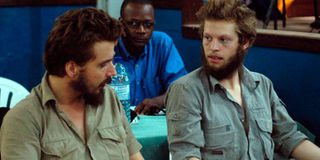Norwegians to die for Congo spying

Norwegians Tjostolv Moland (L) and Joshua French (R) sit in a military tribunal in the city of Kisangani in Democratic Republic of Congo, August 28, 2009. The two men were sentenced to death Tuesday in the Democratic Republic of the Congo after being convicted of murder and espionage. REUTERS
CONGO, Tuesday
Two Norwegian men were sentenced to death Tuesday in the Democratic Republic of the Congo after being convicted of murder and espionage in a military court.
Joshua French, 27, and Tjostalv Moland, 28, were convicted of murdering their driver, attempted murder, importing military weapons illegally, and plotting hostile acts against the Congolese state in the central river city of Kisangani.
Along with the death sentence for both, the court ordered the Norwegian government to pay a US$1 compensation to each Congolese citizen, an amount Judge Claude Disimo said totals over $60 million.
The two are both former members of Norway’s military, and thus were tried in a military court. French and Moland claim to have come to the Congo to set up a private security firm before they were arrested and charged with murder and treason in early May when their driver, Abedi Kasongo was found dead with a bullet through his head.
Moland, who the court accused of shooting the driver, was convicted of murder, attempted murder and illegal importation of weapons. French was convicted of complicity to murder, and attempted murder. Both were convicted of spying on the Congo for the Norwegian government.
The two have denied all charges, claiming that their caravan was attacked by gunmen 60 kilometres outside the city of Kisangani.
Norway’s foreign minister Jonas Gahr Støre earlier denied that the duo were spying for the Norwegian state and that the government would issue response to the verdict shortly. He admitted that the two were former members of Norway’s army, but had left the service in 2007.
Evidence against the two included photographs showing French, in particular, smiling as he washes blood out of the truck they had rented, and cell-phone text messages that the Norwegians say were manipulated. Military equipment seized from the men, including GPS devices, maps and military identification, the court said, proved their guilt.
“The transfer of our information to a foreign authority is against Congolese interests,” Judge Disimo said.
The court also said that the two were guilty of armed robbery, after stealing the vehicle of the dead Kasongo, and ordered the Norwegians to pay his wife and children US$500,000.
But many dismissed the case as a sham.
Jan Egeland, the former United Nations’ under-Secretary General for Humanitarian Affairs said the verdict was based on false evidence.
“It shows how wrong the death penalty is and it is obvious that this sentence is missing. The risk of miscarriage of justice is great,” said Egeland, who now chairs Norway’s Institute of International Affairs.
Moland’s father told Norwegian media that the verdict should be treated as a direct attack against the Norwegian state.
It remains unclear exactly why the two were in the central region of the Democratic Republic of the Congo.
Both have admitted to coming to the Congo to set up a private security firm. They travelled from Kampala, Uganda, across the border to Kisangani, an area crisscrossed with rebels and newly-found vast deposits of oil that have garnered the attention of former military types such as themselves.
According to a security-watchdog website, police in Congo confiscated military IDs, counterfeit UN hats and employee ID badges from an apartment the two shared in Uganda.




